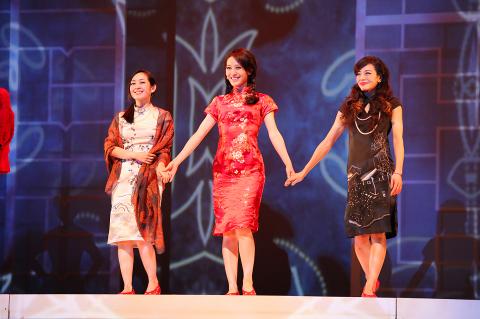One of the flagship productions of the 2013 Kaohsiung Spring Arts Festival (高雄春天藝術節), Forever Dialogue (愛。時尚), premiered in Kaohsiung last week, and will now tour Taiwan. The show, which mixes an exuberant celebration of consumer culture and an intimate portrait of three Chinese women, has brought together a number of big names that guarantee appeal across the Strait.
Forever Dialogue stars Vega Tsai (蔡燦得), a popular presence on Taiwan’s stage and screen; Hong Kong’s Perry Chiu (焦媛), a veteran stage actress; and Chinese screen actress Cheryl Hsieh (謝承穎). At the center of the story is a pair of embroidered silk slippers, which link up a deconstructed tale that starts in 1940s Shanghai and extends to the modern day, following its main characters from the Republican era through to contemporary China, a period in which both the appearance of Chinese women, and the social milieu in which they exist, has changed out of all recognition.
Directed by Li Zongxi (李宗熹), who picked up the Kaohsiung Culture and Arts Award (高雄文藝獎) in 2012 and is a bright new star on the Chinese-language theater scene, Forever Dialogue is a big-budget production showcasing not just its three leading ladies, but also the talents of a top-notch behind-the-scenes team. Given that the show not only focuses on the emotions of three women, but also their material accoutrements, it is fitting that another star of the show is fashion designer Goji Lin (林國基).

Photo courtesy of Taiwan Drama Performance
“It is much more than just a piece of theater,” Lin said. “It is also more than a fashion show. I have designed over 10 sets of costumes specifically for this production, which are presented in a number of catwalk displays. There are fashion shows within the play, and the emotions of the play pervade the fashion show. It’s really an amazing experience, and the first time I have done anything like this in all my years as a designer. The performance, the language and the emotions in the play make the fashion items even more expressive.”
Set design is by Max Li (黎仕祺), who regularly manages the design for mega concerts by stars such as Judy Chiang (江蕙) and Jeff Chang (張信哲), and music is by the multi-award winning Cello Fan (范宗沛), who composed and won a Golden Melody Award for the Original Soundtrack of the hit TV series The Crystal Boys (孽子).
The fact that this show about women, which is supposedly targeted at women, has an almost exclusively male production team might give rise to snide suggestions that not much has really changed in the position of women in Chinese society, but the appeal of the three female stars and the general bling of the production is likely to drown out negative commentary.
By all accounts, the premiere last week in Kaohsiung was a great success, and will now be followed by this weekend’s show in Hsinchu, followed by Tainan, Taipei and Taichung. The show will then tour the region with bookings in Shanghai, Hong Kong, Singapore and Beijing. More information regarding the show and performance schedule can be found at www.performer.org.tw.

Taiwan has next to no political engagement in Myanmar, either with the ruling military junta nor the dozens of armed groups who’ve in the last five years taken over around two-thirds of the nation’s territory in a sprawling, patchwork civil war. But early last month, the leader of one relatively minor Burmese revolutionary faction, General Nerdah Bomya, who is also an alleged war criminal, made a low key visit to Taipei, where he met with a member of President William Lai’s (賴清德) staff, a retired Taiwanese military official and several academics. “I feel like Taiwan is a good example of

March 2 to March 8 Gunfire rang out along the shore of the frontline island of Lieyu (烈嶼) on a foggy afternoon on March 7, 1987. By the time it was over, about 20 unarmed Vietnamese refugees — men, women, elderly and children — were dead. They were hastily buried, followed by decades of silence. Months later, opposition politicians and journalists tried to uncover what had happened, but conflicting accounts only deepened the confusion. One version suggested that government troops had mistakenly killed their own operatives attempting to return home from Vietnam. The military maintained that the

Before the last section of the round-the-island railway was electrified, one old blue train still chugged back and forth between Pingtung County’s Fangliao (枋寮) and Taitung (台東) stations once a day. It was so slow, was so hot (it had no air conditioning) and covered such a short distance, that the low fare still failed to attract many riders. This relic of the past was finally retired when the South Link Line was fully electrified on Dec. 23, 2020. A wave of nostalgia surrounded the termination of the Ordinary Train service, as these train carriages had been in use for decades

Lori Sepich smoked for years and sometimes skipped taking her blood pressure medicine. But she never thought she’d have a heart attack. The possibility “just wasn’t registering with me,” said the 64-year-old from Memphis, Tennessee, who suffered two of them 13 years apart. She’s far from alone. More than 60 million women in the US live with cardiovascular disease, which includes heart disease as well as stroke, heart failure and atrial fibrillation. And despite the myth that heart attacks mostly strike men, women are vulnerable too. Overall in the US, 1 in 5 women dies of cardiovascular disease each year, 37,000 of them